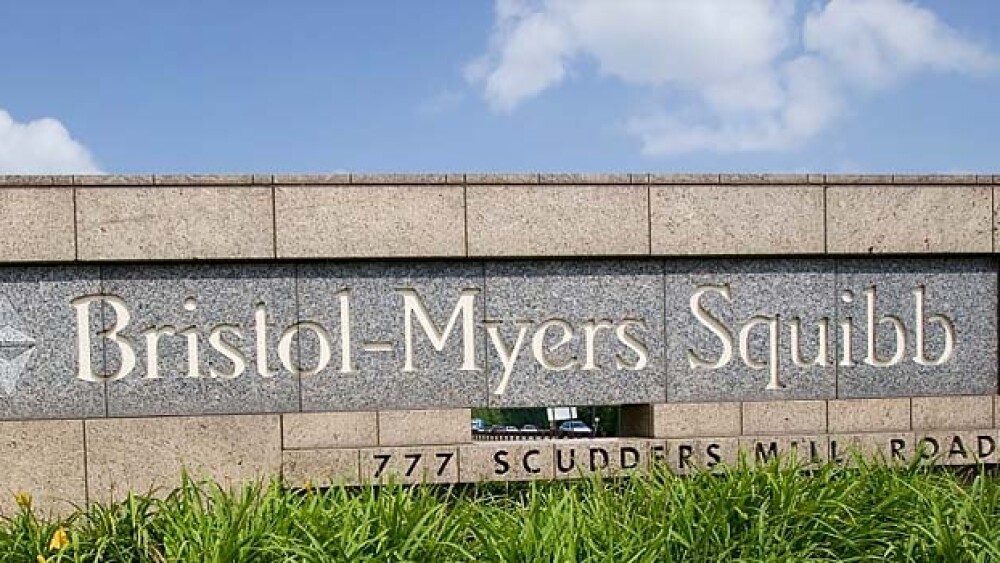BMS shares climb more than 4% this morning after the company announced its anticipated Phase III CheckMate-227 study data.
Shares of Bristol-Myers Squibb are climbing more than 4 percent this morning after the company announced its anticipated Phase III CheckMate-227 study met its endpoints of progression-free survival as a first-line lung cancer treatment.
BMS said its combination of Opdivo (nivolumab) and Yervoy (ipilimumab) is showing “superior” progression-free survival in advanced non-small cell lung cancer (NSCLC) patients whose tumors have high tumor mutation burden (TMB), regardless of PD-L1 expression. The combination treatment was compared with chemotherapy, the company said. Opdivo is a PD-1 immune checkpoint inhibitor and Yervoy targets CTLA-4, a protein receptor that regulates the immune system.
That was good news for the company, particularly after rival drugmaker AstraZeneca’s combination treatment of PD-1 inhibitor Imfinzi (durvalumab) and tremelimumab, a CTLA-4 inhibitor, failed to meet endpoints last year. Some analysts had limited BMS’ chances due to the failure of AstraZeneca’s combination.
BMS was hoping for good news ahead of its 2017 year-end financial report. Brad Loncar, CEO of Loncar Investments, told CNBC that the results from the trial are a “much-needed win” for the company. Loncar said first-line therapies for lung cancer are an important commercial opportunity for a company like BMS.
It was also important for BMS to see the Opdivo/ Yervoy combination succeed as a first-line treatment in NSCLC given a significant setback two years ago when Opdivo surprisingly failed to meet endpoints in a Phase III trial. The anti-PD-1 drug failed as a monotherapy for a “broad patient population” in patients with previously untreated advanced non-small cell lung cancer.
Matthew Hellman, the CheckMate-227 lead investigator, said TMB has “emerged as an important biomarker for the activity of immunotherapy.” The Phase III study showed superior progression-free survival in that predefined non-small cell lung cancer group, said Hellman, who is a medical oncologist at Memorial Sloan Kettering Cancer Center.
“CheckMate -227 showed that TMB is an important, independent predictive biomarker that can identify a population of first-line NSCLC patients who may benefit from the nivolumab plus ipilimumab combination,” Hellman said.
BMS suggests that approximately 45 percent of the TMB-evaluable patients had tumors that expressed high TMB in the study. If that’s correct then that means the combination treatment could help a significant portion of NSCLC patients. Tumor mutation burden is a quantitative biomarker that reflects the total number of mutations carried by tumor cells. Tumor cells with high TMB have higher levels of neoantigens, which are thought to help the immune system recognize tumors and incite an increase in cancer-fighting T cells and an anti-tumor response. TMB is one type of biomarker that may help predict the likelihood a patient responds to immunotherapies, BMS said.
BMS picked the TMB patients using Foundation Medicine’s analytically validated assay FoundationOne CDx.
BMS Chief Executive Officer Giovanni Carforio was certainly enthusiastic about the study. In a statement, he said the CheckMate-227 data are a breakthrough in cancer research. Carforio added that the trial data is a “meaningful step forward” in determining which patients can most benefit from the combination of Opdivo and Yervoy. Findings from the CheckMate-227 trial attest to BMS’ “deep understanding of cancer biology,” he added.
BMS noted that an interim data analysis for overall survival has resulted in the Data Monitoring Committee to recommend the study continue. BMS anticipates overall survival data to be available by 2020.





